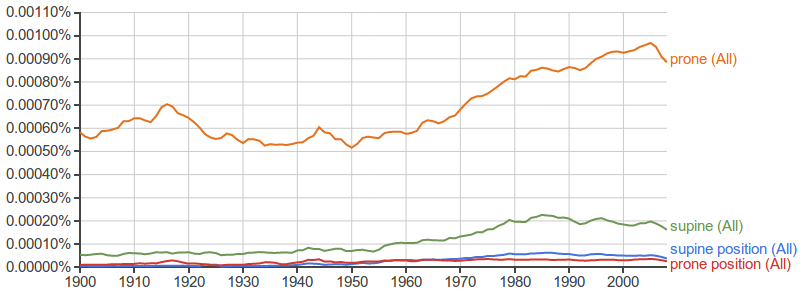As I'm learning and this is more an opinion then factual answer I likely accept the other explanation given. Though as a note: I have ended up with another conclusion. Edit: But I might be wrong. Reading over it I sound more sure then I am and somewhat opinionated ;)
Firstly I can mention that I did not know supine from before. Prone I have only used by the definition:
likely to or liable to suffer from, do, or experience something, typically something regrettable or unwelcome.
Thought there was a possibility it was some common expression thus this question.
After using quite some time looking up these terms I have ended up with this semi conclusion:
Prone is used when one mean lying face down. It is widely used in health care. Second it used within military, marksmanship, training, etc. In the majority of cases it is used correctly and to mean what it is defined as.
"Prone position, face up" seems to be wrong. As in not a commonly used/can mean both, but rather a misunderstanding of the word. Dictionaries and similar works I have checked out does not support a dual meaning of the word.
Wrong use is found in some user comments, computer games, some alternative medicine, some training guides etc. It is very rarely found wrongly used in health care or similar contexts. In short it seems like it often is used as a big word not knowing the meaning.
Also came across the book "Common Errors in English Usage" by Paul Brians which list prone. It states: is often confused with "supine". As such it is not intentionally used as a relaxed definition of the word, but as an error.
Supine is usually used with it's correct meaning, and with a high majority within medicine and the like.
Though Ngram has its faults, and the fact that prone is widely used in other meanings, not lying, one have this graph:

They seem to follow each other pretty close.
Perhaps too opinionated:
As this is in context of first-aid I conclude with that this is a bad error. The fact that it looks like an excerpt from a book written by an MD does not help. If they had not added: ", face up", the advice would be opposite of what is recommended (if it then in fact is supine they recommend). As it stands it is at best confusing.
Yes, I understand language develops and words gets lost. But I also get an impression this is to loosely used as an explanation. It is imperative to have concrete definitions of words to be able to convey a precise language. In professions like medicine this is rather obvious.
Conclusion: erroneous usage.


